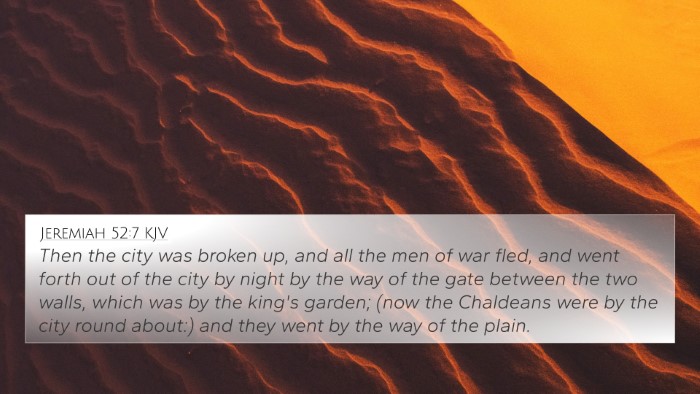Ezekiel 12:4 - Summary and Commentary
Bible Verse: Ezekiel 12:4 - "Then shalt thou bring out thy stuff by day in their sight, and thou shalt go forth at even in their sight, as they that go forth into captivity."
Interpretation Overview
This verse is a part of the prophetic message from Ezekiel, which illustrates the impending siege of Jerusalem and the impending exile of its inhabitants. The actions commanded by God through Ezekiel serve as a vivid symbol of the reality that the people of Judah would soon face. The act of bringing out their belongings symbolizes the departure and captivity that would befall them.
Significance in Context
Ezekiel was a prophet during the Babylonian exile, and his messages often employed dramatic actions to deliver God's truth. This particular command emphasizes the preparation for exile, warning the people of the consequences of their sins and unfaithfulness to God.
Insights from Commentaries
-
Matthew Henry:
Henry emphasizes the symbolic actions of Ezekiel as a clear display of the dire situation. By showing these actions in broad daylight, it would not only capture attention but would also confirm the authenticity of the prophecy and the certainty of God's judgment.
-
Albert Barnes:
Barnes notes the importance of visibility in the act; by doing this in the sight of the people, it serves as a public announcement of their fate, illustrating both the sorrow of captivity and the need for repentance.
-
Adam Clarke:
Clarke elaborates on the purpose behind the prophetic action; it serves to remind the people that their proud and complacent spirit should be replaced by humility and acknowledgment of their past transgressions.
Cross-References and Related Bible Verses
This verse can be cross-referenced with several other scriptures that highlight themes of captivity, exile, and the consequences of Israel's disobedience:
- Jeremiah 25:11-12: Discusses the Babylonian captivity as part of God's judgment.
- Ezekiel 3:25-27: Address Ezekiel's role as a watchman, emphasizing his responsibilities as a prophet.
- Isaiah 39:6-7: Prophesies the Babylonian captivity and the loss of Jerusalem's treasures.
- 2 Kings 25:11: Chronicles the actual events of the city's destruction and exile.
- Daniel 1:1-2: Details the first exile and the deportation of young Israelites to Babylon.
- Lamentations 1:3: Sorrowful reflection on Jerusalem’s abandonment and desolation.
- Zechariah 7:14: Addresses the consequences of not listening to God's messages delivered through the prophets.
Thematic Analysis
The themes derived from Ezekiel 12:4 address the plight of God's people, their unfaithfulness, and the prophetic call to recognize their fate. This verse prompts a deep investigation into the connections between the calamity of Israel and the ensuing prophetic messages that seek repentance.
Like-Minded Themes in Scripture
Similar themes can be observed in various other parts of the Bible, illustrating how interconnected the stories and lessons are throughout the scriptures:
- The Prophet Zephaniah: His messages also encapsulate the judgment against Judah.
- The Exile of Israel in Amos: Amos directly addresses the impending judgment which mirrors Ezekiel’s warnings.
- The Return from Exile in Ezra: This provides insight into God's restoration after judgment, a crucial part of the narrative after captivity.
Application and Reflection
In applying Ezekiel 12:4 to modern life, it serves as a poignant reminder of the consequences of turning away from God. The image of being led into captivity prompts believers to reflect on their commitments and faithfulness toward divine directives.
Tools for Further Study
For those wishing to delve deeper into the study of biblical cross-references, consider utilizing:
- Bible Concordance for finding related verses.
- Bible Cross-Reference Guide to understand thematic connections.
- Cross-Referencing Bible Study Methods to enhance personal and group studies.
Conclusion
Ezekiel 12:4 reminds us of the grave realities that sin can lead to, echoed across many biblical texts. By connecting these teachings through cross-referencing various scriptures, we deepen our understanding of God's continual call for repentance and commitment. By examining these verses together, we create an inter-Biblical dialogue that enriches our faith and understanding.






